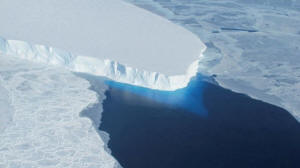|
 Melting
glaciers blamed for subtle slowing of Earth's rotation Melting
glaciers blamed for subtle slowing of Earth's rotation
 Send a link to a friend
Send a link to a friend
[December 14, 2015]
By Will Dunham
WASHINGTON (Reuters) - The melting of
glaciers caused by the world's rising temperatures appears to be causing
a slight slowing of the Earth's rotation in another illustration of the
far-reaching impact of global climate change, scientists said on Friday.
|
|
 The driving force behind the modest but discernible changes in the
Earth's rotation measured by satellites and astronomical methods is
a global sea level rise fueled by an influx of meltwater into the
oceans from glaciers, the researchers said. The driving force behind the modest but discernible changes in the
Earth's rotation measured by satellites and astronomical methods is
a global sea level rise fueled by an influx of meltwater into the
oceans from glaciers, the researchers said.
"Because glaciers are at high latitudes, when they melt they
redistribute water from these high latitudes towards lower
latitudes, and like a figure skater who moves his or her arms away
from their body, this acts to slow the rotation rate of the Earth,"
Harvard University geophysicist Jerry Mitrovica said.
The movement of ice and meltwater is also causing a slight migration
of the Earth's axis, or north pole, in a phenomenon known as "polar
wander," the researchers said.

"Imagine a figure skater who doesn't stick their arms straight out
but rather sticks one at one angle and the other out at another
angle. The figure skater will begin to wobble back and forth. This
is the same thing as polar motion," Mitrovica said.
The research looked at the changes in the planet's rotation and axis
in light of the world's sea level rise in the 20th century as a
result of increasing global temperatures.
The melting of the ice sheets and the rise in sea levels moved the
planet's rotation axis, or north pole, at rates of less than a
centimeter per year, Mitrovica said. This melting slowed the Earth's
rotation and increased the duration of a day by about a thousandth
of a second over the 20th century, Mitrovica said.
[to top of second column] |

"These are small effects," but are another indication of the
profound impact of human-induced climate change on the planet,
Mitrovica said. The observed rotation slowdown does not pose a
danger to the planet, he said.
If polar ice sheets melt at higher rates this century, as experts
forecast them to do, the impact on Earth's rotation will grow,
Mitrovica said.
The research was published in the journal Science Advances.
(Reporting by Will Dunham; Editing by Sandra Maler)
[© 2015 Thomson Reuters. All rights
reserved.]
Copyright 2015 Reuters. All rights reserved. This material may not be published,
broadcast, rewritten or redistributed.

|